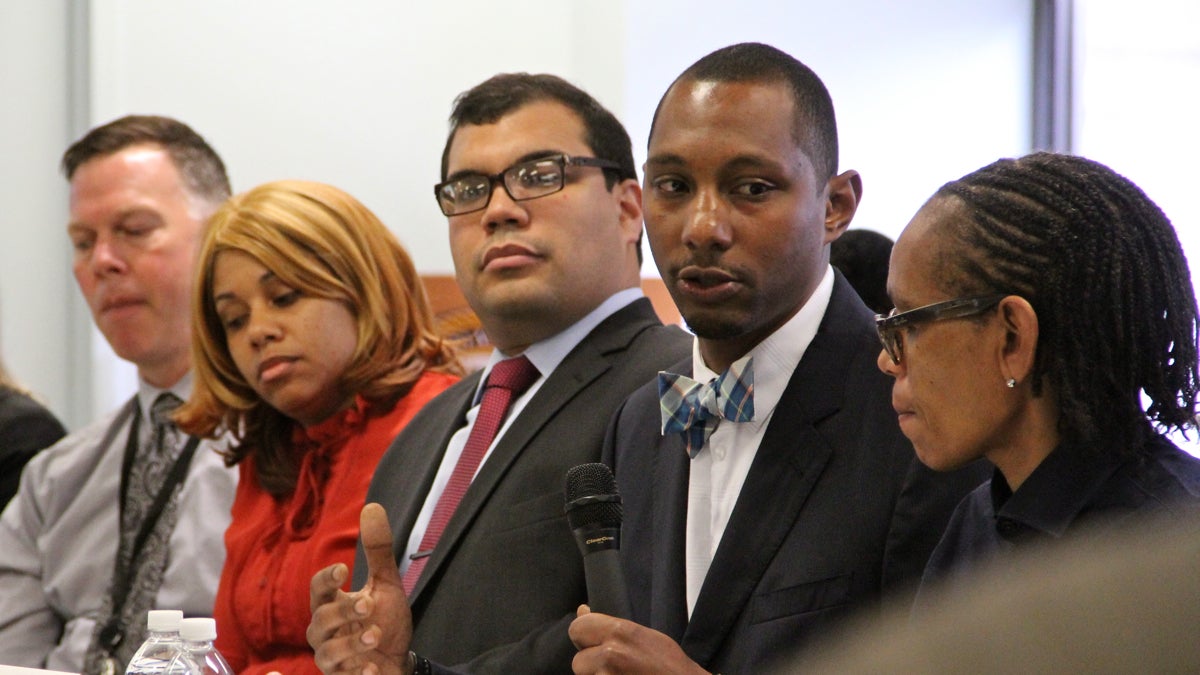SEPTA sued over background checks for prospective hires

Attorney Michael Lee speaks in favor of expungement at a roundtable discussion on the challenges faced by ex-prisoners. He is a lead attorney in a suit that alleges SEPTA denied a man a job because of a prior criminal conviction. (Emma Lee/WHYY)
Philadelphia resident Frank Long applied to be a SEPTA bus driver in October 2014. At the time, Long, 56, had been working as a school bus driver and, given that experience, SEPTA extended a job offer provided he clear a criminal background check.
But the check came back with a 1994 arrest on drug charges and a 1997 conviction for possession. Long’s job offer, consequently, was revoked. Months later, SEPTA sent Long a letter stating that the reneging was “based on its hiring criteria.”
A new federal lawsuit seeking class-action status claims those hiring requirements violate state and federal law intended to protect ex-convicts from job discrimination.
A spokeswoman for SEPTA said its attorneys are still reviewing the 21-page suit.
Five law firms, including the Philadelphia Lawyers for Social Equity and the Public Interest Law Center, have teamed up to represent Long and hope a judge approves the suit as a class-action, allowing additional plaintiffs who have been the victims of a blanket SEPTA policy that allegedly disqualifies job applicants with felony convictions not directly related to the job.
“If we exclude people who have already addressed issues that led to this kind of conduct, then we’re excluding many qualified people who could be the very best at what they’re trying to do,” said attorney Mike Lee with the Philadelphia Lawyers for Social Equity.
Lee said there are at least four other lawsuits pending against other city employers for illegally shutting people out of work because of prior criminal convictions and arrests.
Under Pennsylvania state law, arrests that don’t lead to a conviction cannot be considered by an employer. And felony and misdemeanor convictions can only be regarded by an employer when it’s relevant to the job, or whether the conviction plays into an applicant’s “suitability” for the job, according to the law.
The suit argues that SEPTA routinely tosses applicants based on convictions as a blanket rule, instead of on whether the convictions are related to an applicant’s job suitability.
SEPTA’s federal law violations, according to the suit, have to do with the transit authority failing to give applicants a clear heads-up when its conducting a consumer report. In the case of Frank Long, SEPTA told him verbally that there would be a background check, but never provided it in writing, triggering a technical federal violation, the suit says.
Attorney Lee, speaking on a panel on Wednesday in the U.S. Attorney’s office on the topic of prisoner re-entry, said his law firm runs a clinic that helps ex-convicts clear their criminal history. In the past few years, Lee said he’s filed for more than 6,000 expungements.
“There’s a lot of myths and stereotypes that create the discrimination that people living with criminal records face,” said Lee. “And as a result of that discrimination, the biggest barrier people have to overcome are the ones they create themselves,” he said, referring to employers that exhibit predujice against people who’ve had brushes with the law.
“Which is more important? Your personal history, which is how you and your community remember you? Or your criminal history? Which is how the government remembers its actions against you? And although we control our personal history, many people are dominated by their criminal history,” he said.
Philadelphia expanded ban-the-box provisions last year aimed at reducing bias against ex-offenders, including that employers can only review an applicant’s history the past seven years. It also says they can’t do a background check for most jobs until a conditional job offer is made.
“I’ve lived in Philadelphia practically all my life and have experience doing exactly the kind of work SEPTA was hiring for,” Long said in a statement. “I care about my community and am not a threat to anyone. This job would make a real difference in my life.”
WHYY is your source for fact-based, in-depth journalism and information. As a nonprofit organization, we rely on financial support from readers like you. Please give today.




